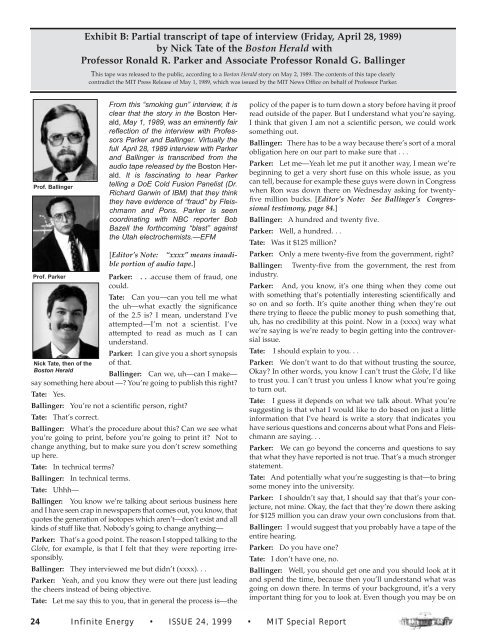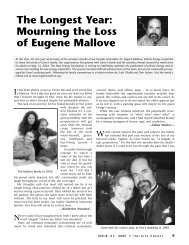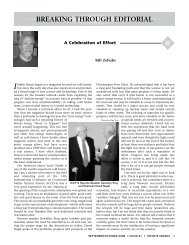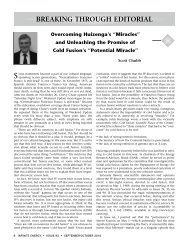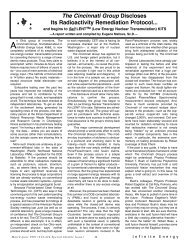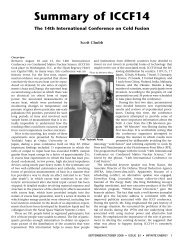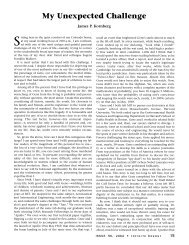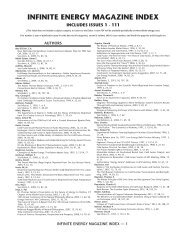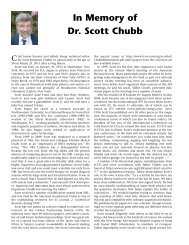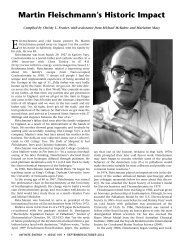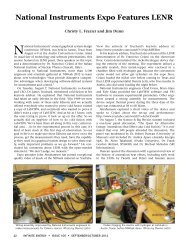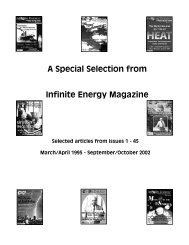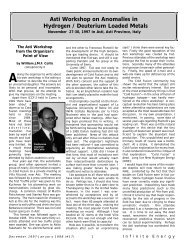MIT and Cold Fusion: A Special Report - Infinite Energy Magazine
MIT and Cold Fusion: A Special Report - Infinite Energy Magazine
MIT and Cold Fusion: A Special Report - Infinite Energy Magazine
Create successful ePaper yourself
Turn your PDF publications into a flip-book with our unique Google optimized e-Paper software.
Exhibit B: Partial transcript of tape of interview (Friday, April 28, 1989)<br />
by Nick Tate of the Boston Herald with<br />
Professor Ronald R. Parker <strong>and</strong> Associate Professor Ronald G. Ballinger<br />
This tape was released to the public, according to a Boston Herald story on May 2, 1989. The contents of this tape clearly<br />
contradict the <strong>MIT</strong> Press Release of May 1, 1989, which was issued by the <strong>MIT</strong> News Office on behalf of Professor Parker.<br />
Prof. Ballinger<br />
Prof. Parker<br />
Nick Tate, then of the<br />
Boston Herald<br />
From this “smoking gun” interview, it is<br />
clear that the story in the Boston Herald,<br />
May 1, 1989, was an eminently fair<br />
reflection of the interview with Professors<br />
Parker <strong>and</strong> Ballinger. Virtually the<br />
full April 28, 1989 interview with Parker<br />
<strong>and</strong> Ballinger is transcribed from the<br />
audio tape released by the Boston Herald.<br />
It is fascinating to hear Parker<br />
telling a DoE <strong>Cold</strong> <strong>Fusion</strong> Panelist (Dr.<br />
Richard Garwin of IBM) that they think<br />
they have evidence of “fraud” by Fleischmann<br />
<strong>and</strong> Pons. Parker is seen<br />
coordinating with NBC reporter Bob<br />
Bazell the forthcoming “blast” against<br />
the Utah electrochemists.—EFM<br />
[Editor’s Note: “xxxx” means inaudible<br />
portion of audio tape.]<br />
Parker: . . .accuse them of fraud, one<br />
could.<br />
Tate: Can you—can you tell me what<br />
the uh—what exactly the significance<br />
of the 2.5 is? I mean, underst<strong>and</strong> I’ve<br />
attempted—I’m not a scientist. I’ve<br />
attempted to read as much as I can<br />
underst<strong>and</strong>.<br />
Parker: I can give you a short synopsis<br />
of that.<br />
Ballinger: Can we, uh—can I make—<br />
say something here about —? You’re going to publish this right?<br />
Tate: Yes.<br />
Ballinger: You’re not a scientific person, right?<br />
Tate: That’s correct.<br />
Ballinger: What’s the procedure about this? Can we see what<br />
you’re going to print, before you’re going to print it? Not to<br />
change anything, but to make sure you don’t screw something<br />
up here.<br />
Tate: In technical terms?<br />
Ballinger: In technical terms.<br />
Tate: Uhhh—<br />
Ballinger: You know we’re talking about serious business here<br />
<strong>and</strong> I have seen crap in newspapers that comes out, you know, that<br />
quotes the generation of isotopes which aren’t—don’t exist <strong>and</strong> all<br />
kinds of stuff like that. Nobody’s going to change anything—<br />
Parker: That’s a good point. The reason I stopped talking to the<br />
Globe, for example, is that I felt that they were reporting irresponsibly.<br />
Ballinger: They interviewed me but didn’t (xxxx). . .<br />
Parker: Yeah, <strong>and</strong> you know they were out there just leading<br />
the cheers instead of being objective.<br />
Tate: Let me say this to you, that in general the process is—the<br />
policy of the paper is to turn down a story before having it proof<br />
read outside of the paper. But I underst<strong>and</strong> what you’re saying.<br />
I think that given I am not a scientific person, we could work<br />
something out.<br />
Ballinger: There has to be a way because there’s sort of a moral<br />
obligation here on our part to make sure that . . .<br />
Parker: Let me—Yeah let me put it another way, I mean we’re<br />
beginning to get a very short fuse on this whole issue, as you<br />
can tell, because for example these guys were down in Congress<br />
when Ron was down there on Wednesday asking for twentyfive<br />
million bucks. [Editor’s Note: See Ballinger’s Congressional<br />
testimony, page 84.]<br />
Ballinger: A hundred <strong>and</strong> twenty five.<br />
Parker: Well, a hundred. . .<br />
Tate: Was it $125 million?<br />
Parker: Only a mere twenty-five from the government, right?<br />
Ballinger: Twenty-five from the government, the rest from<br />
industry.<br />
Parker: And, you know, it’s one thing when they come out<br />
with something that’s potentially interesting scientifically <strong>and</strong><br />
so on <strong>and</strong> so forth. It’s quite another thing when they’re out<br />
there trying to fleece the public money to push something that,<br />
uh, has no credibility at this point. Now in a (xxxx) way what<br />
we’re saying is we’re ready to begin getting into the controversial<br />
issue.<br />
Tate: I should explain to you. . .<br />
Parker: We don’t want to do that without trusting the source,<br />
Okay? In other words, you know I can’t trust the Globe, I’d like<br />
to trust you. I can’t trust you unless I know what you’re going<br />
to turn out.<br />
Tate: I guess it depends on what we talk about. What you’re<br />
suggesting is that what I would like to do based on just a little<br />
information that I’ve heard is write a story that indicates you<br />
have serious questions <strong>and</strong> concerns about what Pons <strong>and</strong> Fleischmann<br />
are saying. . .<br />
Parker: We can go beyond the concerns <strong>and</strong> questions to say<br />
that what they have reported is not true. That’s a much stronger<br />
statement.<br />
Tate: And potentially what you’re suggesting is that—to bring<br />
some money into the university.<br />
Parker: I shouldn’t say that, I should say that that’s your conjecture,<br />
not mine. Okay, the fact that they’re down there asking<br />
for $125 million you can draw your own conclusions from that.<br />
Ballinger: I would suggest that you probably have a tape of the<br />
entire hearing.<br />
Parker: Do you have one?<br />
Tate: I don’t have one, no.<br />
Ballinger: Well, you should get one <strong>and</strong> you should look at it<br />
<strong>and</strong> spend the time, because then you’ll underst<strong>and</strong> what was<br />
going on down there. In terms of your background, it’s a very<br />
important thing for you to look at. Even though you may be on<br />
24 <strong>Infinite</strong> <strong>Energy</strong> • ISSUE 24, 1999 • <strong>MIT</strong> <strong>Special</strong> <strong>Report</strong>


